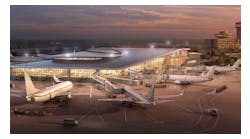A new study commissioned by airport loyalty specialist ICLP has revealed that airports are failing to communicate effectively with passengers. This in turn, is impacting their ability to build the loyalty that could significantly increase non-aeronautical revenue. The 2017 ICLP research, which surveyed both airports and passengers, discovered that there is a profound lack of personalised and relevant communication between the two parties. This is negatively impacting airports’ ability to engage with passengers, and increase both their dwell time and spend.
The research highlights a significant gap between the number of airports that are sending passengers timely communications, and the number of passengers that want to receive them. Currently 83 percent of passengers actively seek updates on flight arrival and departure times from the airport prior to transit, however only 58 percent of airports are sharing this information. Nearly a quarter (23 percent) of passengers surveyed reported that they do not receive any communications from the airports they use, with 65 percent of those passengers declaring they have never been given the option to sign up or subscribe. However, 45 percent of surveyed passengers stated that receiving communications that contained airport offers and discounts prior to travelling would encourage them to spend more.
The study indicated that there is a clear opportunity for airports to build on passenger relationships, with the majority of passengers keen to hear from airports throughout transit. 55 percent of passengers said that they would like to receive information on the day of travel and 48 percent when relevant. 47 percent are happy to receive information at any time after booking their flight, 25 percent when they are at the airport, and 11 percent when they have passed through security. However, even with these wide parameters, many airports are getting the timing very wrong, with 30 percent of passengers stating that they receive communications from the airport post travel, when they are no longer relevant.
Mignon Buckingham, managing director of ICLP, commented, “It is great that many airports are starting to build communication with passengers, but there is a misalignment between the information that airports are communicating and what passengers want to receive. For example,
details of airport parking are sent by 88 percent of airports while just 31 percent of passengers want to receive this information. There is also misdirection around the frequency and timing with which passengers receive information. Furthermore, with the research flagging up the positive news that passengers are open to receiving airport communications, it is worth noting that although 100 percent of the airports taking part in this study provide free access to public Wi-Fi, less than half (only 48 percent) are collecting data from the passengers using this service. When airports do collect data, they rarely use it to maximum effect, with just 45 percent of airports saying they use the information they collect in their marketing campaigns, and an alarming 23 percent confessing that they don’t use it at all.”
Despite the fact that a high proportion of passengers (86 percent) are willing to share their personal information with airports, only 27 percent of airports are using customer data to personalise their communications.
“What the research is highlighting loud and clear is that airports are missing opportunities to capture passenger information and use it to personalise communications in order to drive better engagement and relationships that would in turn secure longer-term loyalty and increased passenger dwell time and spend.”
All data has been taken from 2017 ICLP airport and passenger surveys. 35 airports and 2,589 passengers were surveyed between Jan. 16– 31.



